Ranking the reasons behind Barcelona’s downward spiral
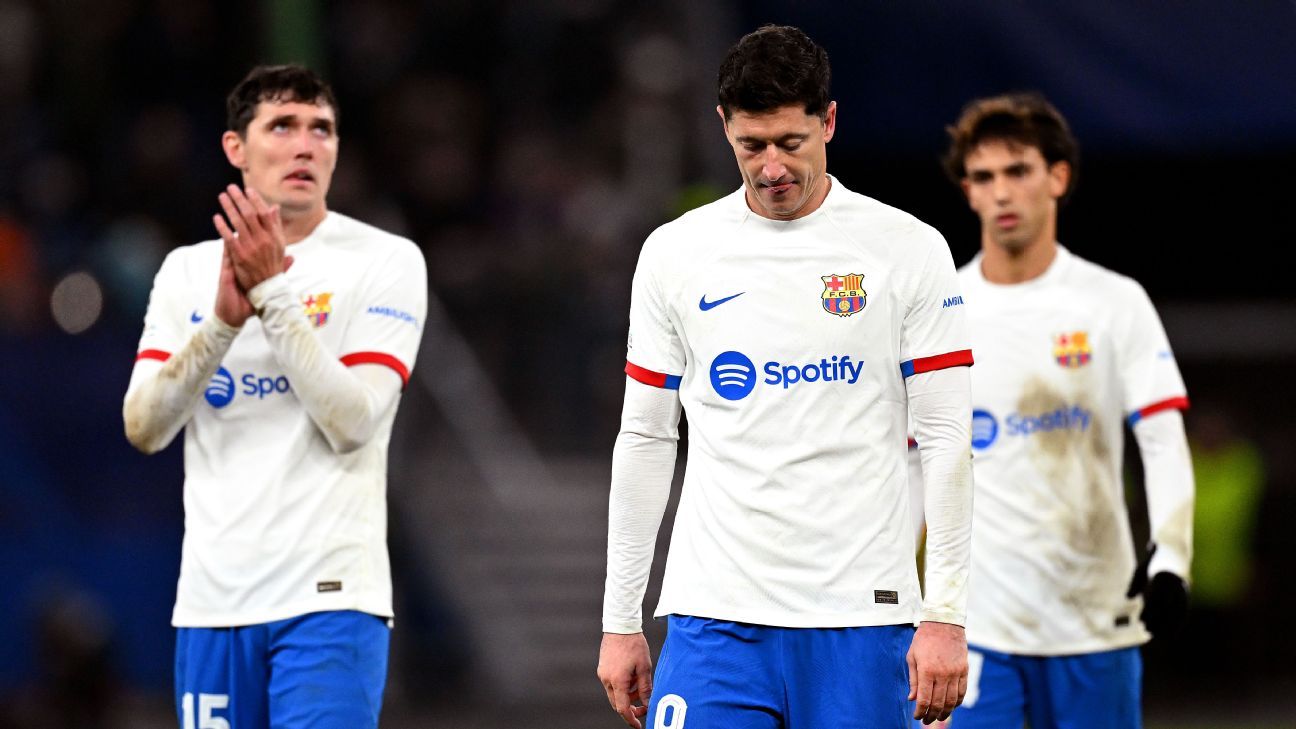
Back in the middle of December, Barcelona lost consecutive matches against Girona and Royal Antwerp. There was a time, not too long ago, when Barcelona would barely lose two games in a season, let alone two in a row to relative minnows like Girona and Royal Antwerp. That time, of course, was when Barcelona’s current manager was still a Barcelona midfielder.
In response to the growing unrest about his team’s performances, manager Xavi Hernandez took a defensive stance. “The media are not united but it is time for us to be more united than ever,” he said then. “Alarm bells always ring when things are not going well, but we can still win four titles.”
A month later, the alarm bells are ringing even louder and after Wednesday’s 4-2 loss to Athletic Bilbao in the round of 16 in the Copa del Rey, Barcelona can only win two titles. “Can” should be understood in only the most literal terms: Per The Analyst‘s projections, Barca have just a 3.2% chance of winning LaLiga. In the Champions League, ESPN Bet’s odds give Xavi’s team about a 7% chance of lifting another European Cup.
– Stream LaLiga live on ESPN+: Barca vs. Villarreal (Saturday, 12 p.m. ET)
Yes, Barca still can win two trophies, but when you take those two probabilities together, it means there’s a less than 10% chance that they win any trophies.
So, what happened, and who — or what — is to blame? Like we did last month with Manchester United, let’s analyze and rank — from most blameworthy to least — all the reasons for Barcelona’s terrible, horrible, no good, very bad season.
1. The bounce of the ball — even Barcelona can be unlucky
The biggest reason we’re all freaking out about Barcelona: the bounces haven’t gone their way.
I’m not asking you to feel any sympathy for one of the richest clubs in the world and one of the founding members of the canceled Super League, an institution that seemingly thinks it deserves to be great without doing any of the work that it takes to be great. My point is simply that, in LaLiga, Barcelona have done — better than anyone else — the most important sustainable thing in soccer: generating a positive balance between creating and conceding chances. And it’s really not close.
Here is a chart of the average differential in expected goals, or xG, per game this season:
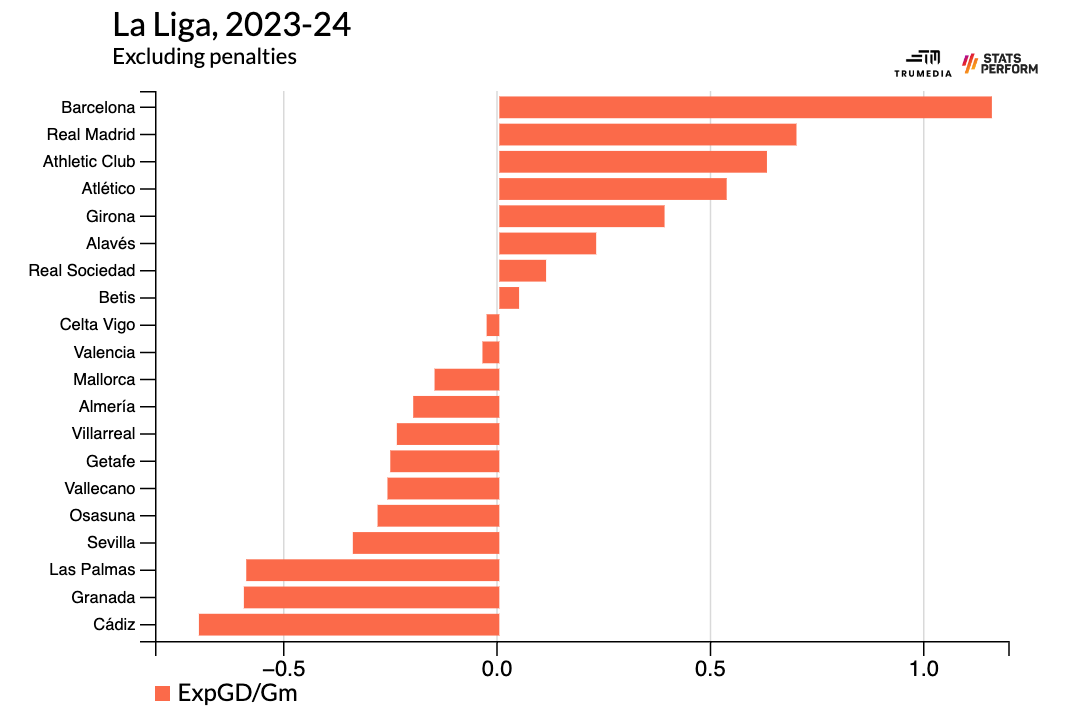
Barcelona’s per-game xG differential is almost exactly the same as it was last season: ever so slightly down to 1.15 xG per game from 1.16. In fact, among Stats Perform’s database, which extends back to 2010, the only teams that have produced a better full-season xG differential in LaLiga all employed either Lionel Messi or Cristiano Ronaldo.
This all isn’t occurring in a vacuum, either, and Barcelona’s struggles aren’t only down to Barcelona. Xavi’s team is currently on an 83-point pace — not enough to win the league, but usually not so bad that it would practically eliminate you from the title race before the end of January. It’s just that Real Madrid are on a 97-point pace, while Girona are on a 94-point pace.
Madrid’s pace, if they hit it, would be the fourth-most points in a single LaLiga season, while Girona’s would be tied for sixth with Luis Enrique’s treble-winning 2014-15 Barcelona side. Or, you know, the one with Messi, Luis Suárez and Neymar.
Neither Madrid nor Girona are playing at a level anywhere near where they’d need to be for us to feel confident that either one will be able to keep up the current pace, but they’ve already banked so many points that it makes Barcelona’s struggles this season seem way worse than they really are. So, as we get into the other reasons for Barcelona’s current crisis — and we start blaming specific people — let’s be clear that it all pales in comparison to the Catalan club being on the wrong side of all the variance that occurs at the moment when a foot or a head makes contact with a ball.
2. Barcelona’s defense fell apart
Obviously, everything you just read about bad luck feels wrong.
We all saw Barcelona get battered by Real Madrid in the Spanish Supercopa final in Saudi Arabia, and this is the shot chart from the match, with goals marked in green. The bigger the circle, the higher the xG value of the shot:
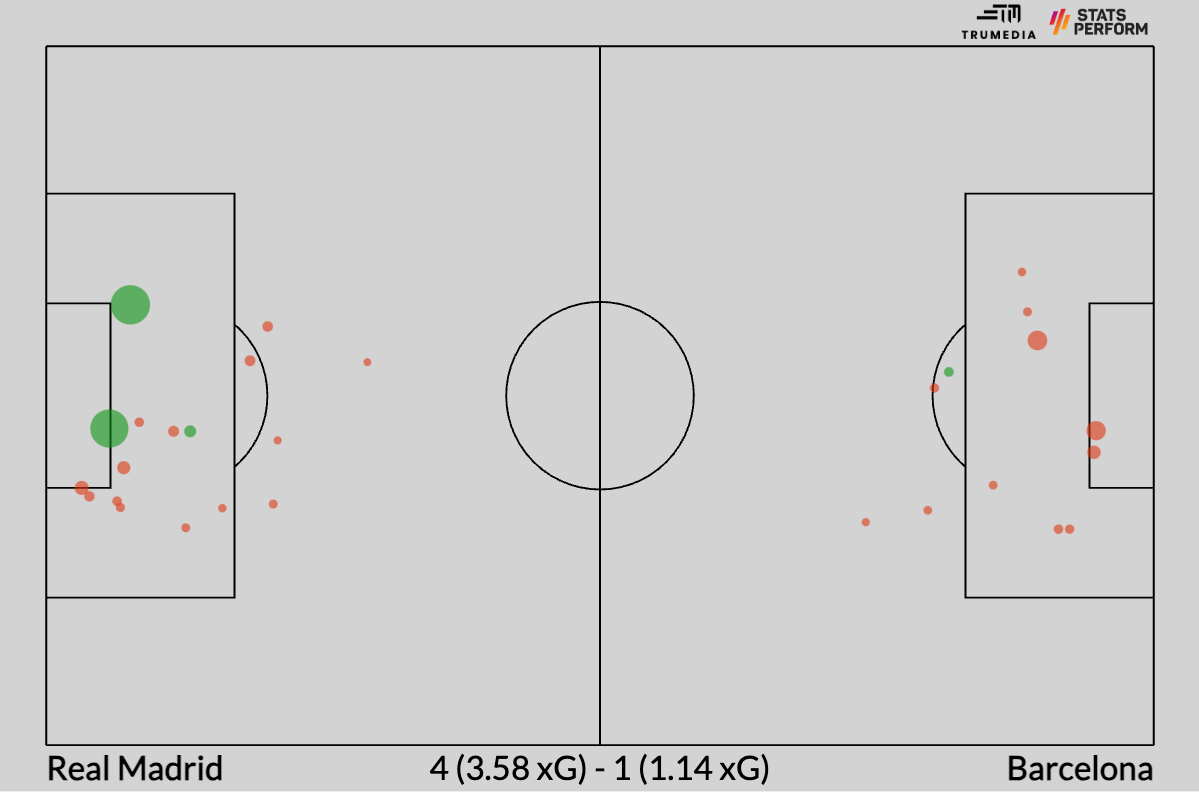
It wasn’t just one bad game.
Let’s look at the shot chart from when Barcelona got pummeled by Athletic Bilbao in the Copa del Rey earlier this week:
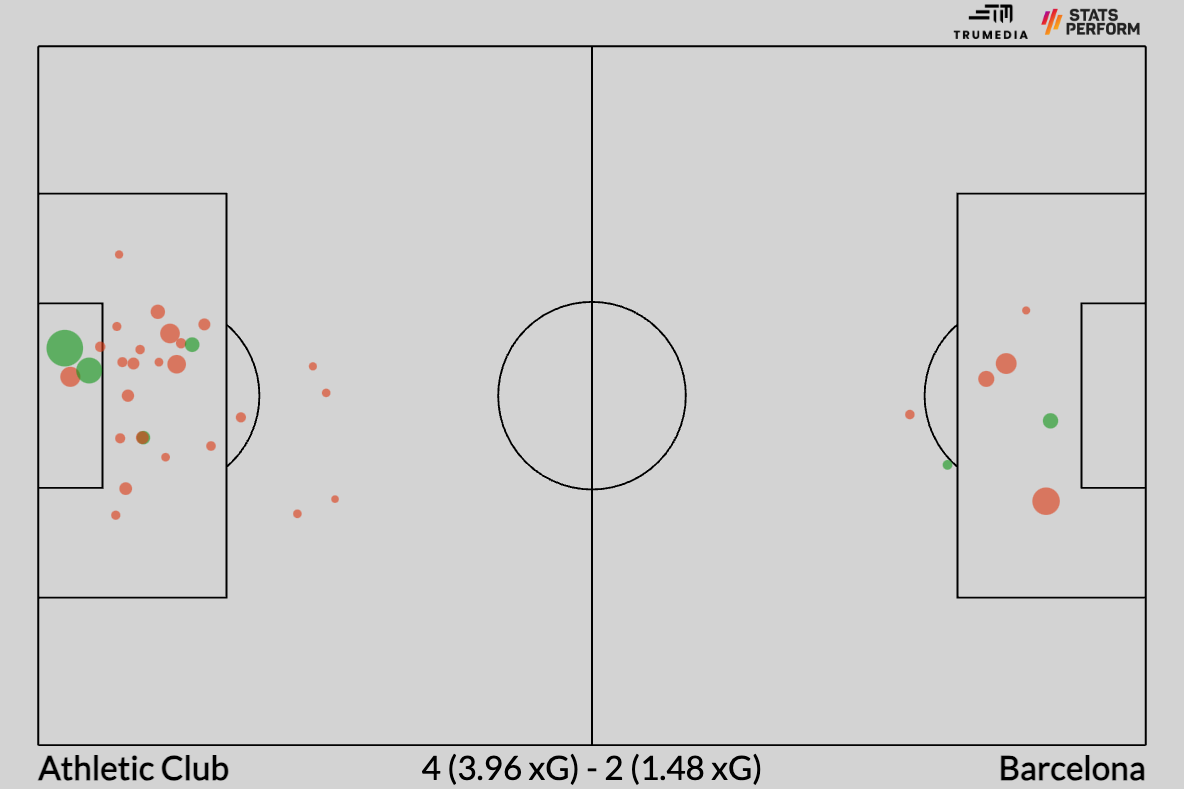
These numbers, of course, do not appear in the aggregate LaLiga numbers. If Barcelona truly were a great-but-unlucky team — that’s what their xG differential is telling us — then they wouldn’t get totally blown off the field, twice, in the span of about 10 days.
Eight goals in two matches would’ve been unthinkable last season, when the main driver behind their league win was one of the best defenses in LaLiga history.
The record for fewest goals allowed in a 38-game LaLiga season is 18, shared by Diego Simeone’s Atletico Madrid in 2015-16 and Deportivo La Coruna in 1993-94. Last year, Barcelona allowed 20. However, neither Atletico nor Deportivo won the league in those seasons, so there’s a legitimate case that the 2022-23 Barcelona team that won LaLiga were actually the best defensive team in the history of Spain’s first division. At least, they allowed the fewest goals of any team to win the league.
This year, Barcelona have allowed 24 goals — with 18 games still left to play. Excluding penalties, that’s 1.2 goals per game, up from 0.4 last season. That’s triple the rate of goals they allowed last year. Put another way, they were arguably the best defensive team this league has ever seen last year. This season, there are 10 teams conceding goals at a lower rate.
It’s not much better when you look at the quality and quantity of the chances they’re allowing, either. Last season, Barcelona conceded 0.8 non-penalty xG per game — the best mark in the league. This season, they’ve conceded 1.1 non-penalty xG per game — the sixth-best mark in the league.
3. Sergio Busquets wasn’t replaced
From a personnel standpoint, there is one big difference from last year to this year.
Last year, Sergio Busquets played 68.4% of the available league minutes. This year, that’s down to zero because he plays for Inter Miami now.
Although Busuqets lost more and more range as the years went by, we can’t ignore the fact that, at 34 years old, he still played nearly 70% of the minutes as a lone defensive midfielder for maybe the best defensive team in LaLiga history. While the impact of Busquets has always been difficult to quantify — a “you know it when you see it” kind of thing — I think we can see the lack of Busquets show up in a couple team-wide statistics.
Last year, Barcelona allowed a total of 2.37 xG from counter-attacking situations — and they’ve already allowed 2.7 xG this year. On top of that, their share of final-third passes has dropped down from 68.1% last season to 65% last season. Few midfielders, ever, have been as good as Busquets at snuffing out counters before they start and pinning the opposition into their own defensive third.
To replace Busquets, Barcelona didn’t really replace Busquets. They brought in Ilkay Gündogan from Manchester City, where he was a bit of a do-everything midfielder — he provided most of his value by breaking into the penalty area and unsettling the opposition defense. As a player, he has nothing in common with Busquets, and that’s continued to be true in Spain.
The other replacement was Oriol Romeu, who is a defensive midfielder, but is also not good enough to play for Barcelona. His playing time has steadily declined as the season progressed: Romeu is the only true holding midfielder on the roster, and he’s played around 36% of the minutes.
In other words, Barcelona lost perhaps the best holding midfielder of his generation over the summer, and then they reacted by playing two-thirds of the following season without anyone in his position.
4. Robert Lewandowski can’t score
While Robert Lewandowski declined a bit from his high-scoring Bayern Munich days, the 35-year-old hasn’t lost the ability to find space for lots of shots. Last year, without scoring a single penalty, Lewandowski still led LaLiga in goals. This year, he’s second among all players in shots attempted and leading the way in total non-penalty xG generated.
It’s just that he hasn’t turned all of the chances into goals yet. He’s scored six non-penalty goals from 10.2 xG — the second-biggest negative gap in the league:
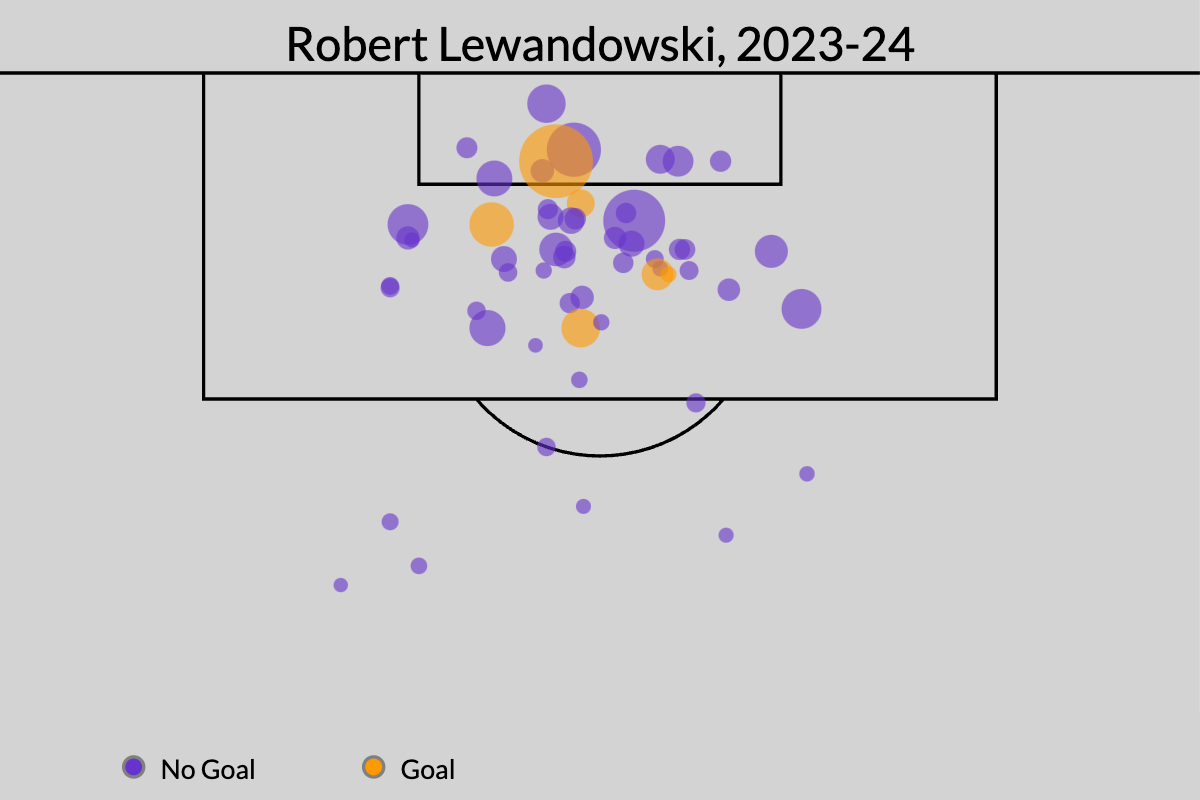
There’s not much evidence or reason to think that finishing skill would decline with age. Rather, your ability to get into the space to take the shot in the first place should be what goes as you start to lose your legs.
Despite a couple lights-out seasons at the end of his Bayern career, Lewandowski has never been a great finisher. He’s scored mostly in line with his xG over the course of his career, if not a bit below it. Even last year he scored fewer goals than his expected total. Still, Lewandowski’s finishing should pick up as the season goes on — we already saw it start to happen with a fortunate deflection off his leg that ended up in the goal on Wednesday.
As Barcelona’s defense has declined, their ability to generate chances has greatly improved from last year. We just haven’t seen that totally borne out in Barca’s results because the guy at the top of the formation hasn’t converted those chances as often as he should — and likely will.
5. Injuries — especially to Marc-Andre Ter Stegen
Pretty much everyone on Barcelona has been injured at some point this season. These are this season’s biggest minutes-decliners when compared to last season – you can see what percentage of Barca’s minutes they played last season, compared to this season:
• Marc-Andre Ter Stegen: 97.9% of minutes, down to 65% (decrease of 32.9%)
• Marcos Alonso: 34.3%, down to 9% (decrease of 25.3%)
• Raphinha: 60.6%, down to 37.2% (decrease of 23.4%)
• Gavi: 74%, down to 52.4% (decrease of 21.6%)
• Pedri: 57.8%, down to 37.9% (decrease of 19.9%)
• Sergi Roberto: 38.2%, down to 19.8% (decrease of 18.4%)
• Frenkie de Jong: 74.1%, down to 56.9% (decrease of 17.2%)
Another area in which Barcelona have declined is in the effectiveness of their press. Opposition pass-completion has increased, while the average starting point of their possessions this season has creeped backward. They’re still the best pressing team in the league, but not as effective as they were last season.
A big reason why: three of their best pressers — Gavi, Pedri, and Raphinha — have played fewer minutes this season. (Gavi is out for the year after tearing his ACL in November.) Combine that with no Busquets to clean things up, and you get a team that’s conceding many more high-quality opportunities this season.
Then combine that with much less Marc-Andre Ter Stegen in goal, and you get a team that’s conceding goals at three-times the rate of last season.
Ter Stegen had the best season of his career in 2022-23, saving 8.3 goals more than expected, based on Stats Perform’s post-shot xG model, which also accounts for the location of the shot on the goal frame. In his 13 starts this season, he’s saved 1.3 goals more than expected, but in the seven matches without him, backup Iñaki Peña has allowed 1.4 goals more than expected.
A season after getting maybe the best shot-stopping performance of any team in Europe, Barcelona’s goalkeeping has been merely average this campaign.
6. Barcelona’s board and front office
Broadly, the club is a mess. They sold off significant chunks of their future revenue in order to sign aging players like Robert Lewandowski. It sort of worked, as they won LaLiga last season, but it also failed because they didn’t get out of their Champions League group and therefore lost potential revenue. This year, they could win the Champions League. It’s not out of the question, but they haven’t built a team that’s one of the major favorites.
I’m not bullish on Barcelona’s long-term future because of these decisions and especially because of the people making them. It might be saved by what looks like quite a promising crop of academy prospects, led by Lamine Yamal, who might be the best 16-year-old soccer player… ever? However, I’m also not sure how much of the blame for this season’s struggles can be pinned on president Joan Laporta and the decision-makers below him.
The Gundogan signing — he’s 33 and plays a role where the team already had some depth — was baffling, and the same goes for the Romeu move. Decisions made last summer also played a role in creating a situation where the other major additions were loan deals for João Cancelo and João Félix. They’re both among the most skilled players at their positions in the world, but they’re both now on their second-straight loan season with a new team. They each put up impressive numbers and look good when they’re on the ball, but I’m not sure either one is a real winning player at the highest level. If they were actually driving winning in a real way, I doubt so many clubs and coaches would’ve seen them up close and then say, “No thanks.”
Barcelona have created a fragile team of ill-fitting players that don’t quite make sense together in a number of different ways. It’s strange, too, that loanees like Cancelo and Felix have become such prominent members of a team that was already really good last season. All of this, together, helped create a situation where they could get clobbered by Real Madrid and Athletic Club.
7. The manager: Xavi Hernandez
Over the past three seasons, only four managers across the “Big Five” top leagues in Europe have produced a per-game, non-penalty xG differential of plus-1 or better over all the matches they’ve coached. The list, only including those with at least one full season worth of games:
1) Pep Guardiola: +1.33
2) Julian Naglesmann: +1.32
3) Thomas Tuchel: +1.15
4) Xavi: +1.04
Given the state that Barcelona were in when Xavi took over and the constant roster churn since, I’m not really sure what else you can reasonably expect. The coach doesn’t have much control over whether his players actually kick the ball into the goal or whether his opponents kick it into his goal.
Now, his Barcelona team has mostly disappointed in knockout tournaments, but that’s such a smaller sample of matches than what we see in LaLiga, week in and week out. I find Xavi’s post-game messaging to be annoying, frequently. It’s as if Barcelona can do no wrong — only wrong can be done to them.
There are definitely better coaches out there. And I think one of the true trademarks of a great manager is how they manage a downturn like the one Barca is currently experiencing. Do you panic and try to fix something that doesn’t really need much fixing and ultimately end up making things worse? Or do you trust in what you’re doing, despite the noise, and ride out the wave?
Those, though, are questions for the future. As for the reasons why Barcelona are currently in crisis? Xavi is low down on the list.



